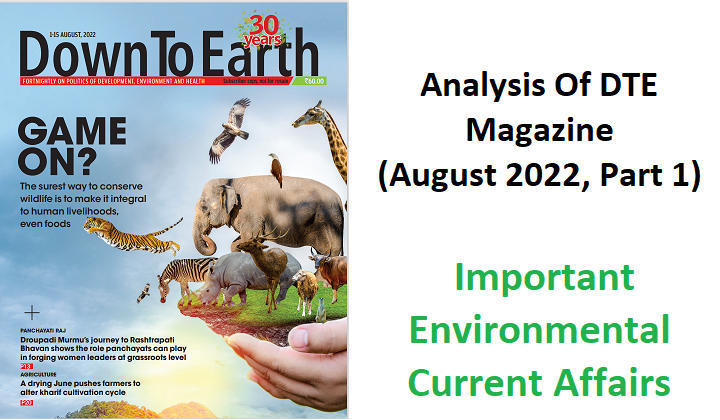Table of Contents
Down To Earth Magazine is a fortnightly magazine focusing on politics of environment and development, published in New Delhi, India.
UPSC Previous years’ questions on Development, Environment, Health and Disaster Management give us a clear idea about the increased importance of Down To Earth Magazine.
Down To Earth Magazine is one of the most important and indispensable source for UPSC Civil Services Exam Preparation. Keeping this in mind, here, we come with ”Gist Of Down To Earth Magazine” which covers important environmental current affairs articles in smooth pointed form, keeping in mind the demand of UPSC aspirants.
Pacific nations play US v China for climate action
Why In News?
- At the latest meeting of the Pacific Islands Forum, held in Suva, Fiji, during July 11-14, both China and the US attempted to woo the nations with investment pledges for coastal economic development and fisheries deals.
- But the nations, which are some of the worst affected by climate impacts, countered with the demand that the world’s two biggest carbon emitters double their climate financing.
- The Forum also adopted stern language to declare a climate emergency, and pushed for meaningful discussions at the 27th Conference of the Parties to the UN Framework Convention on Climate Change to be held later this year.
- In addition, the Forum called for the International Court of Justice to rule on countries’ legal duties to stop climate change.
- The 17 member nations of the Pacific Islands Forum are of great geopolitical importance to major trade rivals, US and China. Their exclusive economic zones, spanning a total of 30 million sq km, provide half of the world’s tuna, the most consumed fish.
About Pacific Islands Forum
- The Pacific Islands Forum is the region’s premier political and economic policy organisation. Founded in 1971, it comprises 18 members: Australia, Cook Islands, Federated States of Micronesia, Fiji, French Polynesia, Kiribati, Nauru, New Caledonia, New Zealand, Niue, Palau, Papua New Guinea, Republic of Marshall Islands, Samoa, Solomon Islands, Tonga, Tuvalu, and Vanuatu.
- The Forum’s Pacific Vision is for a region of peace, harmony, security, social inclusion and prosperity, so that all Pacific people can lead free, healthy, and productive lives.
- The Pacific Islands Forum works to achieve this by fostering cooperation between governments, collaboration with international agencies, and by representing the interests of its members.
- Since 1989, the Forum has organised an annual meeting with key Dialogue Partners at Ministerial level. The Forum currently recognises 18 dialogue partners: Canada, People’s Republic of China, Cuba, European Union, France, Germany, India, Indonesia, Italy, Japan, Republic of Korea, Malaysia, Philippines, Spain, Thailand, Turkey, United Kingdom and the United States.
- The work of the Forum is guided by the Framework for Pacific Regionalism, which was endorsed by Forum Leaders in July 2014.
Return Of Diptheria & Measles
Why In News?
In early July, Australia reported two cases of diphtheria in young children. This is the first time this century the disease has been seen in the country.
What is the reason?
- The return of some diseases is a result of covid-19 disruptions to global immunisation campaigns.
- In 2021, the share of children who received three doses of the diphtheria-tetanus-pertussis vaccine—a global marker of vaccination coverage— fell to 81 per cent from 86 per cent in 2019, according to the World Health Organization and the United Nations Children’s Fund (UNICEF).
- Other childhood diseases that were considered to be under control are also seeing a comeback: over the last four months, Tanzania, Malawi and Israel reported fresh outbreaks of wild poliovirus, while the UK also detected its presence in sewage drains but did not identify any cases.
- Afghanistan, Somalia and South Africa in recent months have also seen a rise in measles cases.
About Diphtheria
- Diphtheria is a serious infection caused by strains of bacteria called Corynebacterium diphtheriae that make a toxin (poison). It is the toxin that can cause people to get very sick.
- Diphtheria bacteria spread from person to person, usually through respiratory droplets, like from coughing or sneezing. People can also get sick from touching infected open sores or ulcers.
- Diphtheria can infect the respiratory tract (parts of the body involved in breathing) and skin. Symptoms of diphtheria depend on the body part that is affected.
- It can cause:
- Weakness
- Sore throat
- Mild fever
- Swollen glands in the neck
About Measles
- Measles is very contagious and can be serious. An unvaccinated child can get measles.
- Two doses of MMR vaccine provide the best protection against measles for your child.
- Measles isn’t just a little rash. Measles can be dangerous, especially for babies and young children.
- Measles spreads through the air when an infected person coughs or sneezes. It is so contagious that if one person has it, up to 9 out of 10 people around him or her will also become infected if they are not protected.
- Measles typically begins with:
- high fever (may spike to more than 104°),
- cough,
- runny nose (coryza), and
- red, watery eyes (conjunctivitis).



 TSPSC Group 1 Question Paper 2024, Downl...
TSPSC Group 1 Question Paper 2024, Downl...
 TSPSC Group 1 Answer key 2024 Out, Downl...
TSPSC Group 1 Answer key 2024 Out, Downl...
 UPSC Prelims 2024 Question Paper, Downlo...
UPSC Prelims 2024 Question Paper, Downlo...




